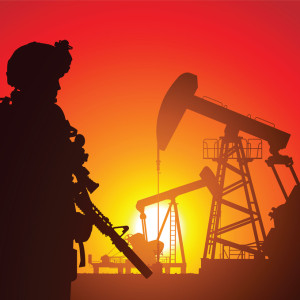In 2004, I deployed as an Army captain to Baiji, Iraq, located just 155 miles north of Baghdad. The city is home to Iraq’s largest oil refinery, which accounts for more than a quarter of the country’s refining capacity.
My tour in Iraq was served in the shadow of endless oil fires, as frequent insurgent attacks on pipelines coming to and from a nearby refinery lit up the sky. From 2004-2007, the city was a known stronghold for Sunni militants who siphoned oil and petroleum products to finance their operations.
Ten years later, it’s as though I am reliving history.
For more than a week, the world has watched as the Sunni Islamist militant group, the Islamic State in Iraq and the Levant (ISIL) carried out a stunningly swift seizure of large territories of northern Iraq. Late Tuesday, ISIL began a concentrated assault on that same refinery outside of Baiji that I watched burn back in 2004.
This attack on infrastructure has severe implications for the Iraqi people, as any disruption at the refinery threatens electricity supplies and ensures long lines at the pump. The last thing the central government in Baghdad needs right now is a more restless population.
However, the international implications go much further.
Growing concerns over oil infrastructure and regional stability have sent reverberations through the international oil market. According to Bloomberg, the ongoing conflict in Iraq has sent crude oil prices to a nine-month high at $119/barrel on June 13, which reflects a sharp rebound after crude oil prices hit record lows on June 3.
The importance of Iraq in the international oil market cannot be understated. Iraq is currently the world’s fasted growing oil exporting country, hitting a 35-year high. And according to the EIA, 60 percent of expected growth in OPEC’s crude production capacity in 2019 would come from Iraq.
Due to Iraq’s importance in the global supply, any slight disruption would send prices skyrocketing with devastating impacts on the global economy. Experts predict that even a moderate disruption of 1 million barrels per day could raise global prices by $37 per barrel in turn shaving 1% off of U.S. GDP.
Iraq’s oil producing fields have largely been protected from the escalating violence by a combination of distance from the conflict and some 30,000 Shiite troops whose sole mission is to guard the precious resource. However, should the fighting continue to expand across the country, even the very risk of disruption will influence global pricing.
Given the current state of the global market, the “new normal” of high and volatile oil prices is not expected to change for now or in the foreseeable future. However, geopolitical turmoil is not the core problem; it is the insatiable yet ever-growing consumption of oil that most threatens global security.
Despite technological advances enabling global production to reach all-time highs, the fact remains supply increases cannot keep up with skyrocketing global demand. According to the Wall Street Journal, oil consumption grew by 1.4%, or 1.4 million barrels a day, but production grew by just .6%, or 560,000 barrels a day.
This new reality—that demand is outpacing production—must be a final rebuke to foolish calls of “drill, baby, drill.” As long as we remain reliant upon oil, the United States will continue to be vulnerable to an ever-increasing volatile international market.
To be sure, we cannot make such a massive change overnight; oil will remain a vital resource in the near- and medium-term. This is why the United States should continue to prioritize stability and security in the largest oil-producing countries as a national security imperative and share best processes and technologies in extraction with allied nations like Cyprus and Greece.
As a veteran, I know first-hand the high price we pay in blood and treasure to secure oil supplies, from protecting desert fuel convoys to keeping international shipping lanes open for oil tankers. The military, the largest national consumer of fossil fuels, is most vulnerable to global price shocks that cut into already shrinking budgets; this is why the Department of Defense is leading the way to a more sustainable future.
Ultimately though, the biggest investment in strengthening our long-term security is to reduce dependence on oil and prioritize the development of alternative energy sources. We can choose to invest in a different future by harnessing the power of more secure, renewable sources, such as wind and solar, that can fuel our economy in new ways.
Through a diversification of our energy resources and a reduction of our dependence on oil, we can reduce our exposure to these unpredictable price shocks and stop funding nations around the world who do not share America’s values. Developing and deploying lower-cost fuel sources will ultimately build a more secure energy future for all.

